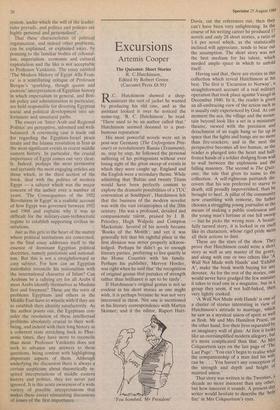Excursions
Artemis Cooper
The Quixotes: Short Stories R. C.Hutchinson, Edited by Robert Green (Carcanet Press £8.95)
101 C. Hutchinson showed a shop- assistant the sort of jacket he wanted by producing his old one, and as the assistant looked it over he noticed the name-tag. 'R. C. Hutchinson', he read. 'There used to be an author called that.' Hutchinson seemed doomed to a post- humous reputation.
His most powerful novels were set in post-war Germany (The Unforgotten Pris- oner) or revolutionary Russia (Testament), as, step by step, he followed the personal suffering of his protagonists without ever losing sight of the great sweep of events in which they were caught up. England and the English were a secondary theme. While admitting that `Balzac and twenty Titans would have been perfectly content to explore the dramatic possibilities of a TUC convention at Southport', Hutchinson felt that the business of the modern novelist was with the vast catastrophes of the 20th century. His was a profound, detailed and compassionate talent, praised by J. B. Priestley, Hugh Walpole and Compton Mackenzie. Several of his novels became `Books of the Month'; and yet it was generally felt that his rightful place in the first division was never properly acknow- ledged. Perhaps he didn't go to enough literary parties, preferring to live quietly in the Home Counties with his family. Perhaps his publisher, Mervyn Horder, was right when he said that 'the recognition of original genius that partakes of strength rather than brilliance is apt to be tardy'.
If Hutchinson's original genius is not so evident in his short stories as one might wish, it is perhaps because he was not very interested in them. Not one is mentioned in his literary correspondence with Martyn Skinner; and if the editor, Rupert Hart- 'You bombed, Mr President' Davis, cut the references out, then they can't have been very enlightening. In the course of his writing career he produced 17 novels and only 28 short stories, a ratio of 1.6 per novel which, as the statistically inclined will appreciate, tends to bear out the assumption. The short story was not the best medium for his talent, which needed ample space in which to unfold itself.
Having said that, there are stories in this collection which reveal Hutchinson at his best. The first is 'Excursion to Norway', a straightforward account of a real military operation that took place against VaasgO in December 1940. In it, the reader is given an all-embracing view of the action such as is usually only experienced by God. At one moment the sea, the village and the moun- tain beyond look like a set in a miniature theatre, viewed with the precision and detachment of an eagle hung so far up in space that the lights and bangs are no more than fire-crackers; and in the next the perspective becomes all too human, as the reader is plunged into the heart and half- frozen hands of a soldier dodging from wall to wall between the explosions and the falling masonry. The second is The Quix- otes, the tale that gives its name to the collection. A self-righteous patriarch dis- covers that his son preferred to starve to death, still proudly impoverished, than be brought to heel. A pillar of the community now crumbling with remorse, the father chooses a struggling young journalist as the means of making a public confession and the young man's fortune at one fell swoop — but he picks the wrong man. A beauti- fully turned story, it is locked in on itself like its characters, whose rigid pride turns all their actions to dust.
These are the stars of the show. They prove that Hutchinson could write a short story as well as any master of the genre, and along with one or two others like 'A Wall Not Made with Hands' and 'Exhibit A', make the book worth buying for any devotee. As for the rest of the stories, one would never have grudged the few minutes it takes to read one in a magazine, but in a group they seem, if not half-baked, then very lightly cooked.
'A Wall Not Made with Hands' is one of a cluster of stories interesting in view of Hutchinson's attitude to marriage, which, he saw as a mystical union of spirit as well as flesh. Mr and Mrs Hamilton Priest, on the other hand, live their liyes separated by an imaginary wall of glass. At first it looks like an oversimplified modern allegory, but it's more complicated than that. As MP Colquortson says on the last page of 'The Last Page': 'You can't begin to realise what the companionship of a man and his wire can be . . . You haven't any conception of the strength and depth and height of married union.'
That story was written in the Twenties, a decade no more innocent than any other, but how innocent it sounds. A present-day writer would hesitate to describe the 'holy fire' in Mrs Colquortson's eyes.






































 Previous page
Previous page